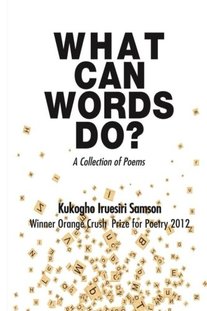Through diverse themes like religion, politics, relationships, and colonialism, Kukogho brings thoughts that penetrates a reader’s consciousness and sometimes, unconsciousness. A professor once told me that the importance of poetry is to carry a reader from a beginning to a destination. He went further to explain that many poems lose their intentions and meanings when they are not conscious of this importance. Kukogho is an impeccable storyteller, even with poetry. He has undiluted wisdom with the way that he samples life’s events through humor, rhymes, in didactic themes, and with the psychology of human actions. As seen in the title “What can words do?” Kukogho draws a reader to reflect on their use of words, languages, and actions. Through diverse themes like religion, politics, relationships, and colonialism, Kukogho brings thoughts that penetrates a reader’s consciousness and sometimes, unconsciousness. One of my favorite poems in “What Can Words do?” is titled “Our Mother’s Meat.” This poem exposes greed in the literal and metaphorical translations simultaneously. This poem is about a stranger that wants the biggest meat in “our mother’s pot” while we, the children starve. In the literal and humorous sense, we all know that visitor that comes to one’s house to eat all the meat in the pot. Many African children can remember the feeling of anger and jealousy upon realizing that the visitor gets the meat that you don’t eat or drinks the wine that you don’t have access to, in your own parent’s house. In this situation, the giver, gives out of courtesy or in affiliation with cultural values. The taker or visitor on the other hand, should be reasonable enough to take little and leave more for the home owners. In the metaphorical or symbolic perspective, this poem is about colonialism and how foreign nations invade our pots of gold, milk, and honey; in Africa. Then, point to the largest meat and say they want it. This poem exposes their greed and motivates patriotism against such acts. Most importantly, I love how Kukogho concludes “What Can Words Do?” by humbling himself before his creator. The poems in the last section of the book teaches a reader to reference God despite all the gains, misfortunes, and wanderings. “What Can Words Do?” Carried me from knowledge to wisdom. Kukogho, just like he did in his other book; “I Said These Words,” has proved again, that poetry is a carrier of meaning, and life with the use of words. Comments are closed.
|